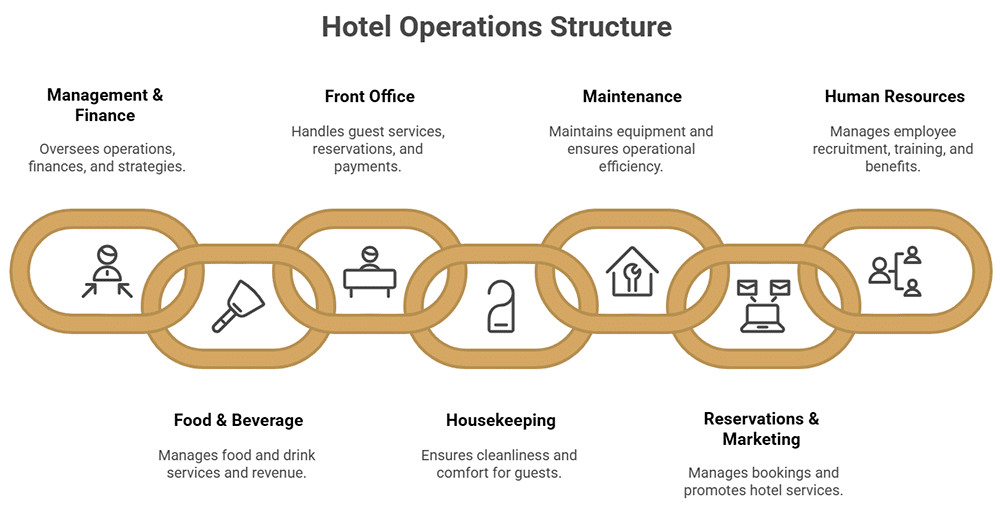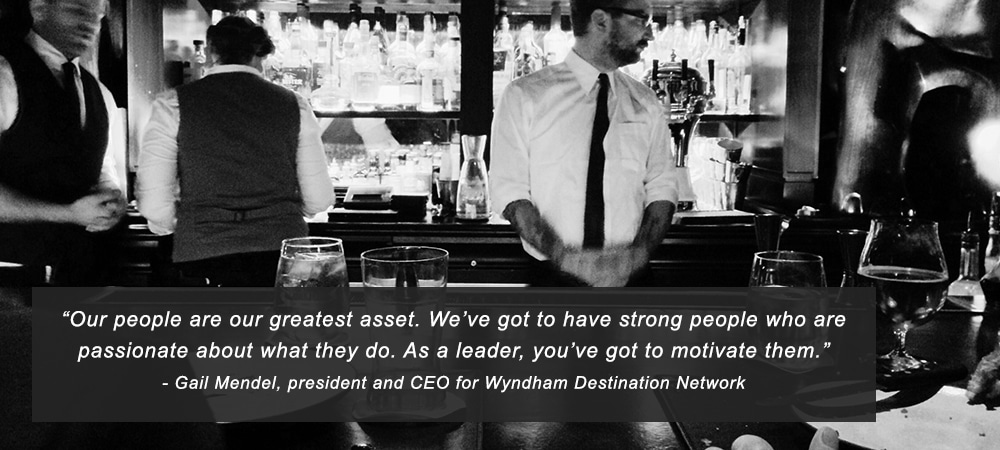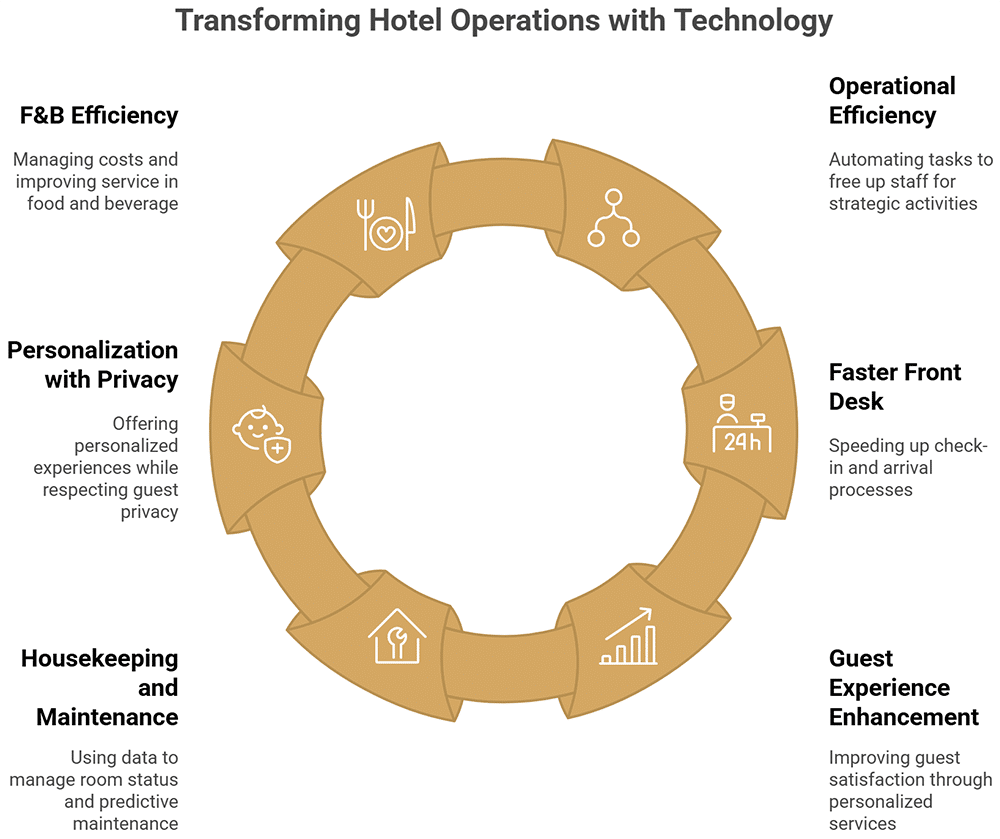If you have ever dreamed of working in the hotel management industry, you should know that this type of job comes with many exciting and even challenging opportunities. To manage a hotel successfully, you will need certain skills and managerial knowledge. In this article, get detailed information on how to get started in the hotel management business.
Table of Contents:
- What is The Hotel Industry?
- What is Hotel Management All About?
- What is the Difference Between Hospitality and Hotel Management?
- A Brief History of Hotel Management
- Which Degree Do You Need For Hotel Management?
- What Kind of Jobs Can You Get With a Hotel Management Degree?
- The Essentials on Hotel Operations
- What Are the Different Hotel Departments?
- Sustainability and ESG Are The New Management Imperative
- Staffing and Human Resources in Hotel Management
- How Technology and AI Are Transforming Hotel Operations
- Major Hotel Brands and Their Management Strategies
- Hotel Revenue Management
- Overview of the Most Common Hotel Positions
- How to Make Sure You Hire the Best Hotel Staff
- Unlock Hotel Management Opportunities With a Hotel Course
- Guide For Hotel Owners and Managers
- Asset Management for Hotels
- Global Outlook of Hotel Management (2025–2035)
What Is the Hotel Industry?
The hotel industry deals with all types of guest accommodation. In fact, the hotel industry not only relates to luxury hotels and resorts but also includes overnight accommodation in guesthouses, motels, inns, and hostels as short-term types of accommodation. According to the Hotels Market – Global Industry Analysis and Forecast by MMR, the hotel market is expected to reach $1663.82 billion by 2029.
The main purpose of hotels is to provide guest travelers with food, drinks, services, and shelter while they are away from home. You can find more information about the hotel industry in the article “Hotel Industry; Everything You Need to Know About Hotels!”.
What Is Hotel Management All About?
Hotel management involves the management of anything that’s related to the hotel industry. Suppose you want to gain a foothold in this business.
In that case, you will need to learn about all the techniques of managing a hotel business, including marketing, hotel administration, catering management, housekeeping, and accounts. The primary goal behind learning the ins and outs of hotel management is to run a hotel successfully while simultaneously managing other aspects of the business.
Table: Aspects of Hotel Management
What is the Difference Between Hospitality and Hotel Management?
The main difference between hotel and hospitality management is, as the name suggests, hotel management covers all aspects of managing a hotel. In contrast, hospitality management is a broader term that deals with people management in sectors such as nightclubs, casinos, restaurants, transportation, and hotels.
A Brief History of Hotel Management
From the early 17th century, business owners across America started building and establishing inns to serve the accommodation needs of travelers. Initially, these inns only offered basic services, but as time passed and demand for short-term accommodation grew, the hotel owners became prepared to provide guests with more facilities.
Since then, the hotel industry has expanded further as people have been willing to pay more for better quality services. This industry has always strived to fulfill the changing demands of society and has developed into an essential part of the economy. Today, travelers can find different types of accommodation based on their budget, from cheap bed and breakfasts to luxurious 5-star hotels.
Which Degree Do You Need For Hotel Management?
You will usually need a bachelor’s degree with extensive work experience to qualify as a hotel manager. However, in some cases, a school diploma will suffice if the candidate has vast knowledge and work experience in the hotel industry.
In addition to a degree or diploma, you can expect to take courses in economics, catering management, accounting, finance, marketing, hospitality, and/or computer studies. Some universities also offer advanced Master’s degrees in hospitality management, often taken by hotel managers looking to progress to regional management positions.
Video: Is it Really Worth Taking a Hotel Management Course?
What Kind of Jobs Can You Get With a Hotel Management Degree?
Hotel management can open up a vast number of other opportunities in the industry. According to the Number of Travel and Tourism Jobs Worldwide Report by Statista, the global number of jobs in the tourism and travel industry is expected to reach 430 million by 2033. For Hotel Management degree graduates, this might include cruise ship hotel management, restaurant management, catering management, airline catering services, and guest house management. Some of the job positions that are related to your degree are:
- Accommodation manager
- Retail manager
- Event organizer
- Hotel manager
- Catering manager
- Restaurant manager
- Pub manager
- Customer service manager
- HR manager
- Travel agent
The Essentials on Hotel Operations
Hotel operations teach you how to become knowledgeable in all aspects of hotel management and operations. You will learn about the key features of hotels, their responsibilities to customers, and how to provide good service to guests. The aim of this course is to train those who wish to work in the hotel industry with the knowledge and expertise to become competent hotel managers. The hotel operations and management departments require well-trained staff to ensure customer satisfaction.
No matter what size or standard hotel you wish to manage, you must have an adequate understanding and skills to cater to guests’ demands. The marketing part of hotels is another essential process that helps managers promote their businesses and prosper. These and much more are all covered by the hotel operation courses.
What Are the Different Hotel Departments?
There are several different hotel departments, which must all work together to achieve shared objectives and deliver a positive experience for guests. The main departments seen in successful hotels are:
1. Management & Finance Department
Hotel management is critical to the success of a guest accommodation business, and the management and finance department oversees the core day-to-day operations. This can include managing hotel services, overseeing events, devising strategies, solving problems, and meeting with business partners. Meanwhile, the finance aspect involves managing all aspects of hotel finances, including tracking revenue and expenditure and planning financial strategies. Hotel finance should be structured on the Uniform System of Accounts for the Lodging Industry (USALI) so results are comparable across properties and time. The latest editions (managed by HFTP) standardize departmental P&Ls, add schedules for energy/water/waste, and improve owner/brand cost transparency.
2. Food & Beverage Hotel Department
The food and beverage department also contributes to successful hotel management because many properties make much of their revenue through selling food and drinks to guests. This department is responsible for purchasing the ingredients and stock needed by hotel restaurants and bars, preparing meals, and serving food and drinks.
CBRE’s latest operating-costs analysis (using data from its Trends® survey) shows F&B department revenue up ~2.8%, with food & beverage purchase costs down 2.3% as the mix shifted toward buffets/banquets. Meanwhile, labor rose 4.5% and supplies +9.4%. It is evidence that active menu engineering and group recovery can protect margins even with wage pressure.
3. Front Office Hotel Department
The front office hotel department serves as the face of the hotel, handling issues like reservations, guest services, and processing payments. The department most often comes in contact with customers, and the front office must also collaborate closely with hotel management and other departments.
Cornell research shows that raising a hotel’s online review score by 1 point (on a 5-point scale) lets it increase price by ~11.2% while maintaining occupancy/market share, linking service/recovery at the desk directly to revenue. Content analysis of reviews also flags “front desk” as a frequent driver of low ratings when issues occur, reinforcing investment in training, scripts, and escalation SOPs.
4. Housekeeping Hotel Department
The housekeeping department within a hotel works to provide guests with a safe, comfortable, clean, and visually pleasing environment. Core duties include cleaning rooms, changing sheets, carrying out laundry duties, upholding quality standards, and reporting issues to maintenance teams or senior hotel management figures.
Regional benchmarking from the Asian Productivity Organization documents wide variance across Asian city hotels and highlights process discipline and training as key drivers of output and quality. Use live status apps, inspection checklists, and cross-training to stabilize standards and labor. Track defect rates and service recovery to protect review scores (and thus ADR).
5. Maintenance Hotel Department
The maintenance department in a hotel is responsible for maintaining all hotel equipment, tools, and technology, including repairing broken pipes, heating systems, air conditioning units, and items within hotel rooms and common areas. Often, repair requests will be issued by hotel management or by the housekeeping team.
The EPA ENERGY STAR program notes U.S. hotels spend ~6% of operating costs on energy and recommends benchmarking in Portfolio Manager to track Energy Use Intensity (EUI) against national medians. Combine these actions with preventive maintenance (PM schedules, CMMS work orders) and track kWh per occupied room and out-of-service room hours to prove impact. For day-to-day guidance, use ENERGY STAR’s Energy & Water Efficiency Checklist for Hotels.
6. Reservations & Marketing Hotel Department
The reservations and marketing department is in charge of all activities related to hotel reservations, including processing reservations, amending bookings, and updating room availability information. On top of this, marketing duties can include online and offline advertising, content marketing, search engine optimization, and more.
Use sponsored listings tactically. For example, Fairmont Monte Carlo ran Expedia Group TravelAds and saw +85% YoY rooms booked and +28% revenue/occupied room during low season. Balance OTA and direct. Skift forecast scenarios suggest direct could surpass US$400B globally as brands deepen loyalty and digital conversion, making CRM, metasearch, and site UX critical alongside OTA visibility.
7. Human Resource Hotel Department
Finally, the Human Resources department is in charge of many of the duties directly related to the workforce itself, including talent acquisition, training, and the development of employees, ensuring hotel management is in keeping with labor laws and regulations, interviewing, and overseeing the provision of employee benefits.
Skills remain a global issue. The ILO notes persistent shortages and the need for digital, service, and green skills across tourism. HR should track training completion, retention, and safety metrics and align policies with labor laws while building clear career paths and benefits to attract and keep talent.
Read “Hotel Departments: Learn About All the 7 Sections of a Hotel” for more information.
Sustainability and ESG Are The New Management Imperative
Sustainability is now core to hotel strategy and owner value.
Environmental Impact and Initiatives
Sustainability has become central to hotel management strategy. According to Verdant’s sustainability analysis, 23 global hotel organizations, including Marriott and Hilton, have established the Hotel Carbon Measurement Initiative for measuring carbon footprint, with over 15,000 hotels already adopting this approach.
Hotel companies’ climate-related initiatives typically focus on four key areas: energy efficiency, carbon emissions, water conservation, and waste reduction, according to CBRE’s global ESG report. The financial implications are substantial, with the annual carbon footprint of the hospitality industry estimated at 3% of global carbon emissions in 2022.
Consumer Demand for Sustainability
Guest preferences increasingly favor environmentally responsible hotels. According to Hotel Tech Report’s sustainability statistics, a study found that 81% of travelers surveyed said they plan to choose a sustainable accommodation option in the coming year. Additionally, a third of guests research a hotel’s environmental and social practices before booking, and 44% of guests under the age of 25 do so.
Implementation Strategies
Leading hotels demonstrate innovative sustainability approaches. Smart energy management systems employ sophisticated machine learning algorithms to continuously analyze local weather patterns, historical thermodynamics, and peak demand loads, optimizing energy consumption while maintaining guest comfort.
Hilton’s Travel with Purpose program developed Sustainable Design Checklists for owners and developers to support informed decisions on sustainability during design, construction, renovation, and conversion, embedding environmental considerations throughout the property lifecycle.
Staffing and Human Resources in Hotel Management
Both staffing and human resources (HR) are key issues within the field of hotel management. In the sections below, you can explore some of the most significant staffing and HR issues.
Recruitment and Training
One of the biggest hotel management challenges involves actually recruiting skilled workers and training them to carry out their jobs effectively. For best results, training activities should be varied and should cover soft skills as well as the more technical, job-specific skills your new recruits will need.
According to AHLA’s staffing survey, 67% of surveyed hotels report staffing shortages, with 12% severely understaffed, affecting their ability to operate. Hotels have increased wages by 82% over the last six months, yet 72% still cannot fill open positions.
Your recruitment process should focus on finding candidates with the right experience, core skills, and mindset. Training can then be used to bring these recruits to full competency. You should also allow great performers to access training that will allow them to progress to more advanced and better-paid roles, as this boosts job satisfaction.
Employee Retention Strategies
The industry has the highest quit rate of any sector, with 4% of workers leaving their jobs every month, according to CiHMS analysis. Despite recovery efforts, the total hotel labor force will still be down nearly 225,000 workers from 2019, when the industry employed 2.36 million people.
Therefore, retaining staff is necessary for optimizing business operations and your financial results. After all, replacing employees who leave your business is costly and time-consuming. A crucial part of effective hotel management involves implementing strategies that boost employee retention and avoid unnecessary staff turnover.
Generalized options here include providing training so that employees can advance their careers, providing a degree of flexibility in terms of work hours, and ensuring high-performing employees are rewarded with recognition or bonuses. However, it is also important to communicate with individuals and respond to their specific needs, too.
Addressing Diversity and Inclusion
Those involved in hotel management need to be more aware than ever about issues surrounding diversity and inclusion. In particular, hotels need to ensure their recruitment strategy results in a workforce that is diverse in terms of backgrounds, ages, cultures, and gender identities.
It is vital to overcome unconscious biases and ensure nobody is unfairly discriminated against, especially on the basis of things like race, gender, and disabilities. Managers and others involved in the recruitment process may need to undergo training in this area. Inclusive workplaces also benefit from diversity of ideas and improved morale.
Legislative and Industry Initiatives
Industry associations advocate for policy solutions. AHLA calls for expanding the H-2B guestworker program and passing the Asylum Seeker Work Authorization Act to help hotels address critical staffing needs. These legislative efforts aim to expand the available workforce while maintaining compliance with immigration regulations.

Jacopo Focaroli, CEO & Founder, The Host“When focusing on the issue of inclusivity, it is important to remain authentic at all times. Promoting diversity needs to go beyond token gestures and should form a fundamental part of your culture. This means ensuring that your hotel is inclusive in its recruitment, marketing messages, and approaches to the guest experience. It also means taking the time to listen to feedback and respond appropriately if your hotel ever falls short. For those involved in hotel management, it is worth contemplating how inclusive your hotel is for people from different backgrounds. Are there groups of people who could feel excluded? Are there steps you can take to avoid this? Are there reasonable adjustments you can make to assist disabled people? Do LGBTQ+ guests feel welcome and safe? Are women receiving the same workplace opportunities and pay as men? Inclusivity throughout your business should be the norm.” Click here to read more hotel marketing tips from our Hospitality Expert Panel. |
How Technology and AI Are Transforming Hotel Operations
Technology is now built into every step of hotel operations, from how rooms are priced to how a guest gets a late checkout. Below is a practical look at what’s changing and how to use it well.
1. Operational Efficiency Through Automation
Artificial intelligence revolutionizes hotel operations across multiple dimensions. According to NetSuite’s analysis of AI in hospitality, automation can automate repetitive tasks such as data entry, inventory management, and customer service, freeing up hotel staff to focus on more strategic activities. According to a McKinsey survey, almost two-thirds of organizations now use generative AI tools, nearly double the percentage from ten months prior. In hospitality specifically, just over 70% of short-term rental managers report using AI tools, and 61.8% believe AI represents a competitive advantage in the marketplace, according to HFTP’s key statistics on AI.
2. Faster Front Desk and Frictionless Arrival
Cloud PMS and mobile tools speed up check-in, ID/credit validation, and key delivery. Kiosks and mobile key work well at busy times or in select-service hotels; staffed desks stay essential for complex needs and high-touch service. AI helps by pre-assigning rooms based on readiness, preferences, or upsell potential, so lines move and early arrivals are easier.
3. Guest Experience Enhancement
Technology implementation directly improves guest satisfaction. Hotel Tech Report notes that 70% of guests approve of chatbots for common questions like hotel hours. Meanwhile, AI solutions enable hotels to offer personalized services by analyzing guest data for better customer experience, tracking preferences such as room temperature, pillow type, and dining choices.
4. Housekeeping and Maintenance with Data
Housekeeping gains the most from simple, clear tech. Apps show live room status, priorities, and special requests; supervisors receive photo checklists and spot issues early. Predictive maintenance uses sensor data (HVAC, elevators, boilers) to schedule repairs before breakdowns. This reduces out-of-order room time and avoids surprise costs.
5. Personalization That Respects Privacy
A consolidated guest profile (from CRM/CDP) stores preferences, stay history, and consent. AI suggests welcome notes, amenity choices, and targeted offers—without being intrusive. Consent and data minimization matter: only use data the guest has agreed to share, and make opt-outs easy. Personalization should feel helpful, not spooky.
6. F&B Efficiency and Quality Control
Digital menus, inventory links, and POS analytics help chefs manage cost and reduce waste. AI can forecast covers, flag slow-moving items, and recommend menu changes by season or event calendar. Service teams receive prompts to time courses better, pace banquets, and suggest pairings. Guests see faster service and clearer allergy information.
Major Hotel Brands and Their Management Strategies
Marriott: Asset-Light Scale, Loyalty, and Tech
Marriott follows an asset-light model, focusing on management and franchise agreements instead of owning hotels. This allows the company to grow quickly and invest more in loyalty and technology. According to Skift, Marriott has over 573,000 rooms in development, which could expand its global portfolio by 36% if completed.
The company’s “barbell strategy” targets both luxury and midscale markets, ensuring balance across segments. Strategic alliances, like its partnership with MGM Resorts, strengthen market reach. Marriott also aims to cut its carbon emissions by 30% by 2030, adopting renewable energy and sustainable operations worldwide.
Hilton: Commercial Engine and Service Culture
Hilton’s “commercial engine” unifies brand marketing, sales, revenue, and distribution to grow profitable share. According to Hilton’s official Year in Review, the company signed and opened more hotels than ever before, adding nearly 100,000 guest rooms to its portfolio, achieving net unit growth of 7.3%.
Technology innovation drives Hilton’s competitive advantage. The launch of Spark and LivSmart Studios brands led to the development of a new proprietary property management system, increasing operational efficiency by 25% in pilot locations, according to MightyTravels’ analysis. Additionally, Hilton’s LivSmart Studios brand features an AI-powered energy management system, cutting energy use by up to 30%. Hilton’s partnership with Small Luxury Hotels of the World added around 400 luxury properties, extending its global reach and reinforcing its service culture and guest experience leadership.
Hotel Revenue Management
Hotel revenue management is one of the least understood aspects of the hotel management business. While many hotel owners understand the importance of proper revenue management strategies to increase occupancy, they don’t always utilize them in their business.
Although revenue management is not something new to this industry, it is highly valued by hotel managers who are running successful businesses. With the changing faces of booking patterns, adopting a robust hotel revenue management strategy is of utmost importance. Discover the importance of using the right revenue management strategies for your business by referring to this article, ‘Hotel Revenue Management – Optimising your Hotel Revenue’.
Video: Revenue Management Explained
Hotel Management & Hotel Positions
There are many different job roles within a typical hotel, from hotel management and senior departmental leaders to kitchen staff and front desk workers. Having an understanding of the main hotel positions can help to improve your knowledge of the industry and can assist with personal career management, too.
Read “Overview of the Most Common Hotel Positions” for a breakdown of the jobs you would expect to find in most hotels, along with a description of what each role actually entails.
How to Make Sure You Hire the Best Hotel Staff
For those in recruitment and hotel management roles, finding suitable new employees is a major responsibility. Successful hotels can identify when they need to hire new hotel staff and then take the necessary steps to pinpoint what positions need to be filled and what skills and qualities the new recruits will need to bring to the table.
In our “How to Make Sure You Hire the Best Hotel Staff” article, you will learn more about why and when you should hire new employees, complete with seven tips that will help you choose the best candidates for your needs.
Unlock Hotel Management Opportunities With a Hotel Course
There are many different responsibilities associated with hotel management, and the role requires an in-depth knowledge of the industry and hotel operations, along with specific hotel-related skills. For this reason, many employers prefer candidates to have completed a hotel course that teaches them the most important elements.
Take a look at the “Hotel Course: A List of Courses & Hotel Educators” article for a more in-depth exploration of hotel courses, the educators who design and offer these courses, and websites that can help you find them.
Video About Hotel Management
Below you find a video from Brentwood Open Learning College which explains more about hotel management.
Guide For Hotel Owners and Managers
Hotel management is a highly competitive job that requires knowledge and experience. As a hotel manager, you must balance capacity and demand by maximizing the effectiveness of your hotel’s facilities and resources. You must also keep up with the rising online travel agencies that have added another dimension to this industry.
Developing your hotel revenue management requires new measures to be adopted for the purpose of customer satisfaction. While hotel marketing and revenue management can be complex, you can use many low-cost and effective strategies in your hotel business. Here is a free comprehensive guide to ‘Revenue Management & Hotel Marketing Strategies’, including practical advice and tips on optimizing revenue.
Asset Management for Hotels
Hotel asset management is the process of managing a hotel property to maximize both its profitability and its value. This includes developing and implementing strategic plans for the hotel, managing hotel operations, and ensuring that the physical assets are well-maintained.
Hotel asset management also involves identifying and mitigating business risks and seeking opportunities to improve the hotel’s performance. In “Hotel Asset Management: Definition, Importance, and Practices“, you’ll learn everything you need to know about asset management for hotels. You’ll learn what hotel asset managers do and how they can help you develop your business.
Global Outlook of Hotel Management (2025–2035)
The next decade will bring major changes to how hotels are managed worldwide. According to the World Travel & Tourism Council (WTTC), the travel industry will contribute around $16.5 trillion to the global economy by 2035, making up about 11.5% of global GDP. UN Tourism expects international travel to keep growing by 3–5% each year, driven by a larger middle class and strong demand for unique, experience-based trips.
Hotel management’s focus is shifting from “growth at any cost” to profitable growth. Owners will reward teams that protect rate integrity, optimize labor, and improve flow-through. Technology will completely reshape hotel operations. The hospitality robotics market is expected to exceed $3 billion by 2030, with robots handling up to one-fourth of hotel tasks. Voice assistants are forecasted to reach a $79 billion market by 2034, and 77% of travelers already prefer automated messaging for service requests. Artificial intelligence (AI) will shift from being experimental to essential, helping fill an expected 8.6 million worker gap in hospitality by 2035.
Sustainability will also become mandatory, not optional. The EU’s Corporate Sustainability Reporting Directive (CSRD) will push hotels toward transparent environmental reporting. Global demand for energy-efficient systems, like lighting, projected to grow from $257 billion in 2025 to over $510 billion by 2034, will accelerate green upgrades.
Overall, the future of hotel management will balance AI-driven automation with human service, combining smart technology, sustainability, and authentic hospitality to enhance guest experiences while protecting long-term profitability.
Hotel Management FAQs
Once you have successfully started your career in hotel management, keep in mind that you will need ongoing training in the form of personal development courses and workshops to stay updated with this ever-changing industry. Hotel managers must always ensure their skills and knowledge are kept up-to-date with the latest market trends, or they will risk falling behind their competitors.
Want to Learn More About Management in Related Industries?
All hospitality, travel, and tourism-related industries have commonalities; however, specific, unique factors influence management in each industry. You can learn more about management within related industries in the following articles.
- Hospitality Management: The Essentials About Hospitality
- Tourism Management: All You Need to Know About Tourism
- Restaurant Management: Everything You Need to Know
More Tips to Grow Your Business
Revfine.com is the leading knowledge platform for the hospitality and travel industry. Professionals use our insights, strategies, and actionable tips to get inspired, optimize revenue, innovate processes, and improve customer experience.Explore expert advice on management, marketing, revenue management, operations, software, and technology in our dedicated Hotel, Hospitality, and Travel & Tourism categories.











The information provided through this article will help us to get a better understanding about hotel management and it sectors. Thank you for listing it and sharing it with us.
Thank you for providing all this good information about hotel management.
You provided a really good article with great information about hotel management. I really appreciate your efforts. Thank you for sharing it.
Great Blog, extremely informative and helpful. Keep up the good work.
Thank you so much for sharing this informative article about hotel management. This website is very useful for us and our students.
Thanks for sharing this informative blog post! This blog post helped me a lot to better understand what types of skill sets are required to start a hotel management business.
Nice Work, I really liked reading this article about hotel management. Extremely informative and helpful. Keep sharing more good content.
This is one of the best posts about hotel management.
It is a great article that gives a better idea of what Hotel Management is. It will be a great help if you and your team can elaborate more on specific courses and rank the institute for that particular course.
Hi Aha, thank you for your feedback. In the article “Hotel Course: A List of Courses & Hotel Educators”, we piled up a list of hotel courses and a list of hotel educators. We also included a list of websites where you can find different hotel courses. Some of the websites also compare and rank similar courses. Hope this helps.
Thank you so much for sharing all the hospitality management tips!
This really great information about hotel management. Very extensive and useful!
This is really a great article about Hotel Management! Thank you.
Great article, we learned a lot from this article about hotel management.
Thank you for sharing this nice article about hotel management. Please keep sharing this type of articles.
Great post about how to manage a hotel. Very interesting, good job.
This is really great information about hotel management, thanks!
Thank you so much for all information about hotel management. It’s the best information I could find, it’s very helpful. After reading this article, I can also help other people understanding this topic.
It is a very useful blog about hotel management.
This article was an enjoyable read. Thank you for sharing insightful information about hotel management.
Thank you for sharing the information about hotel management, very helpful.
Thank you for this article about hotel management. It has been very useful for us.
Would it be possible to have this information about hotel management in a PDF format?
Hi Cheik, unfortunately, we don’t have the information about hotel management on this page unavailable in a pdf format. That said; you could use “Right mouse-click”, choose “Print” and save it as PDF. In general, this works as well :)
Thank you for all the provided information about hotel management.
The Complete Guide by Revfine is a comprehensive and informative guide for anyone interested in a career in hotel management. The article covers everything from the basics of hotel management to advanced topics such as revenue management and marketing. The article is well-organized and easy to follow, making it a valuable resource for students and hospitality industry professionals.
Thank you for giving the article “Everything You Need to Know About Managing a Hotel.” I loved your blog, and thanks for publishing this!! I am pleased to come across this exceptionally well-written content. Thanks for sharing, and I look for more in the future!
This article on hotel management is a gem. I appreciate the depth and clarity of the information. It covers various aspects crucial to successful hotel management, from guest experience and staff training to revenue strategies and technology integration. The focus on personalization for practical guest experiences resonates deeply, highlighting how even small gestures can leave lasting impressions.